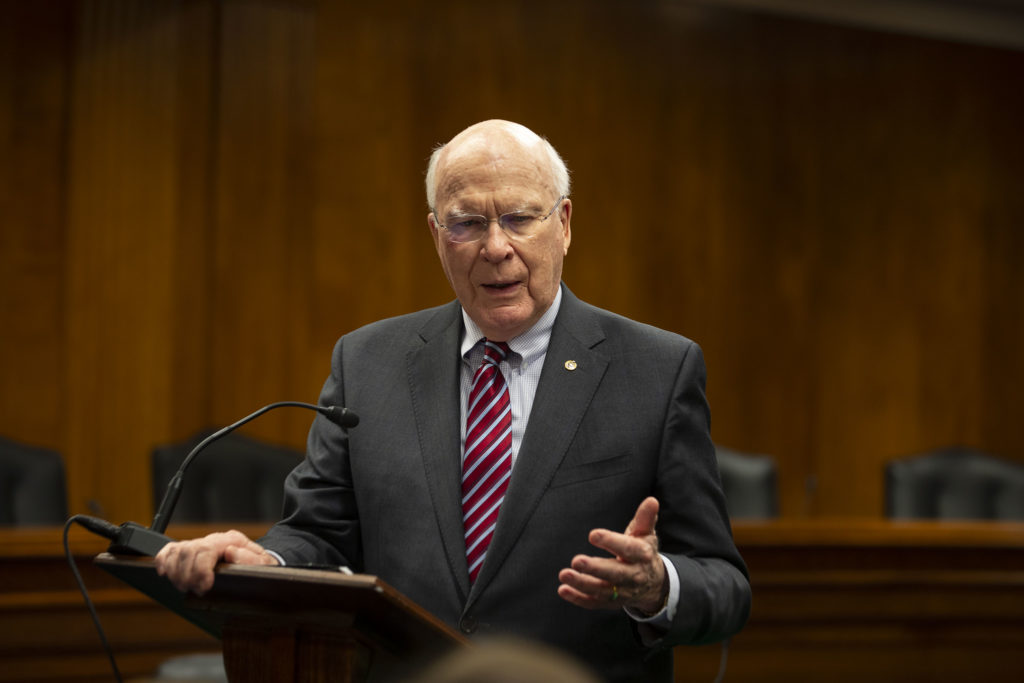Sen. Patrick Leahy recognizes World Learning and School for International Training’s global impact in statement to US Senate
Announcement Date: December 20, 2022 | School for International Training
On December 13, Sen. Leahy submitted a floor statement to the U.S. Senate in recognition of World Learning’s 90th anniversary. The statement highlighted the global impact World Learning, School for International Training, and The Experiment in International Living have made over nine decades and thanked the staff, faculty, alumni, and participants for their important ongoing efforts.
Below is a reprint of his statement which was submitted to the Congressional Record, an official account of the remarks made by senators and representatives while they are on the floor of the Senate and the House of Representatives.

Madam President, I rise today to celebrate the 90th anniversary of World Learning, a nonprofit organization based in Brattleboro, VT, that is dedicated to building stronger human connections through people-to-people exchanges, international education, and global development programs.
World Learning is more than Vermont's window to the world; it is its door. Its history is deeply rooted in the Green Mountains of southern Vermont. The organization is guided by our State's values of tolerance and interest in the world, living a purposeful life through serving others, and building communities by welcoming newcomers with empathy and dignity.
I am proud that World Learning's impact extends well beyond Vermont. World Learning through its School for International Training (SIT) administers more than 90 development programs in over 30 countries, teaching English to refugees, expanding STEM training opportunities, and increasing job opportunities for young adults from all backgrounds.
World Learning's youth, academic, and professional exchanges bring over 2,000 emerging leaders annually to the U.S. from nearly 160 countries for degree and nondegree programs and professional development and networking opportunities. These programs build enduring ties between future leaders and their U.S. host communities and place American culture and values front and center.
In 1932, World Learning—at that time known as The Experiment in International Living—established the first program in the country to enable young Americans to study abroad and engage in intercultural communication. Through the Experiment, students first lived in the homes of families from the countries where they studied. The then-radical idea of the “homestay,” as The Experiment's founder Dr. Donald Watt put it, is how people would “learn to live together by living together.”
In 1964, another prominent innovator, Dr. John A. Wallace, founded SIT, an extension of The Experiment, and directed SIT until 1978. Jack was a good friend whose leadership at SIT built on The Experiment platform with programs that sent thousands of young learners around the world.
In the immediate aftermath of World War II, The Experiment sent young Americans across the Atlantic to Western Europe as peacemakers to assist in rebuilding war-ravaged communities across the continent. These young Americans became our Nation's first generation engaged in international community service and international volunteerism.
At the height of the Cold War, President John F. Kennedy asked young Americans to serve their country in the Peace Corps and build human connections and a greater understanding between nations and people. The Experiment was the inspiration behind the vision of international service by Kennedy and Sargent Shriver, the first Peace Corps Director. Shriver was a participant in The Experiment, traveling to Germany and Austria in 1934, and then leading other youth groups for the organization in 1936 and 1939. In 1964, another prominent innovator, Dr. John A. Wallace, founded SIT, an extension of The Experiment, and directed SIT until 1978. Jack was a good friend whose leadership at SIT built on The Experiment platform with programs that sent thousands of young learners around the world. Over time, World Learning has helped design and launch nearly 70 Peace Corps projects and train volunteers for service in more than 30 countries.
The Experiment also rose to the challenge of supporting the U.S. State Department in the largest refugee training and resettlement program in history, assisting more than 250,000 South East Asian refugees at processing centers in Thailand and Indonesia. They led skills assessments, English language instruction, and cultural orientation training. They demonstrated once again the organization's steadfast commitment to building human connections, healthy communities, and peace.
That commitment continues today, at World Learning's headquarters in the town of Brattleboro, where they welcome refugees and support their integration into communities around southern Vermont. As the first stop in Vermont for newcomers from Afghanistan, Ukraine, and elsewhere, World Learning brings together staff, faculty, alumni, and neighbors to offer language, cultural orientation, and friendship in a program that is a national model for effective refugee integration.
The organization is guided by our State's values of tolerance and interest in the world, living a purposeful life through serving others, and building communities by welcoming newcomers with empathy and dignity.
I have covered a lot of history in these remarks. That is to be expected when one speaks about World Learning and its many contributions over the past 90 years. This is a time when the world needs what World Learning offers and does best. Many of the challenges we face in my State of Vermont are the same challenges seen in towns and provinces in countries around the world, such as climate change, resettling refugees, combatting infectious diseases, protecting democracy, and the list goes on.
I am just one of many Vermonters who takes immense pride in World Learning's history of bringing people together to develop innovative solutions to shared challenges and to recognize our common humanity. I thank World Learning—its staff and faculty, alumni, and participants—for their achievements and important ongoing efforts.
